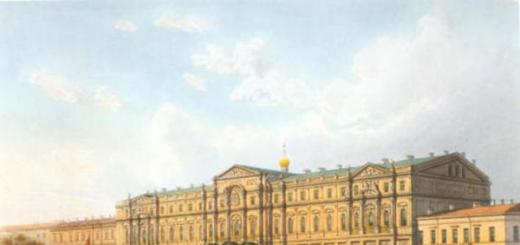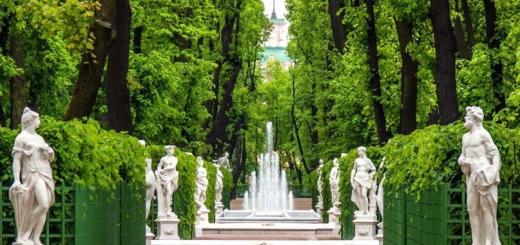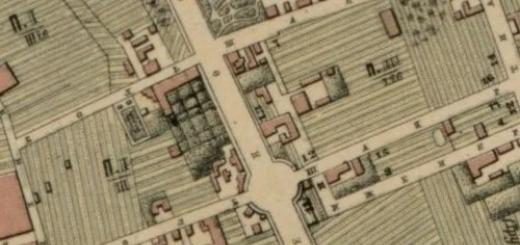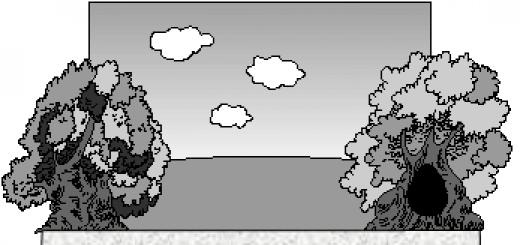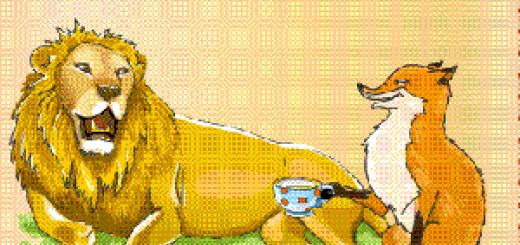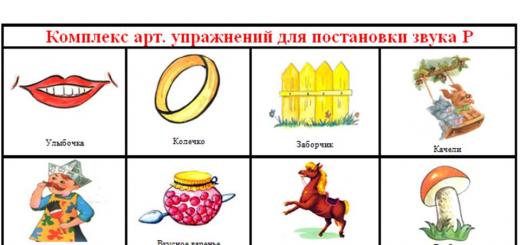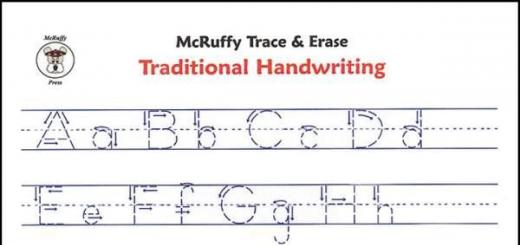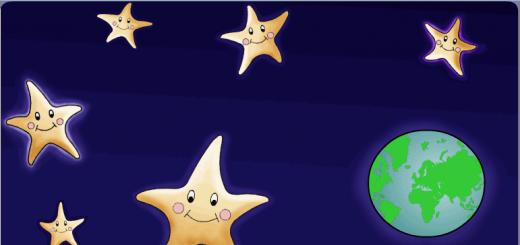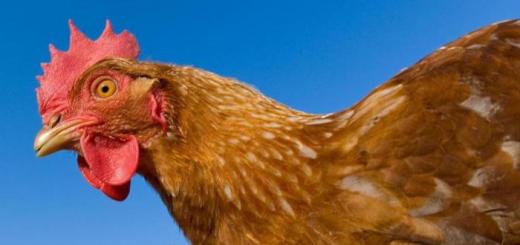Guys, we put our soul into the site. Thanks for that
for discovering this beauty. Thanks for the inspiration and goosebumps.
Join us at Facebook And In contact with
Sometimes we uselessly spend our free time chatting with friends in in social networks or posting another photo on Instagram.
Instead of this website offers you a selection of extremely useful sites for self-development.
- is an educational platform that offers everyone online courses from leading universities and organizations in the world.
- Universarium - global project, which provides an opportunity to receive quality education from the best Russian teachers and leading universities for millions of Russian citizens.
- Khan Academy - a free educational resource contains a collection of over 4200 free micro-lectures in various disciplines - from literature to cosmology.
- Udemy is a knowledge fair with over 10 million registered students from around the world today. The program includes more than 40 thousand courses.
- NIWEB is an online learning platform that, together with leading universities, develops online educational products in order to spread quality education in Russian.
- University Without Borders is a platform for the exchange of relevant academic knowledge for a Russian-speaking audience, regardless of place of residence, geography, place of work or study, as well as socio-economic status.
- HTML Academy is an online course that aims to turn anyone from a beginner into a web development professional.
- Lumosity - site for development mental abilities. It seems to be nothing new, but Lumosity has its own peculiarity: the application selects individual program"training" for each person. Don't waste your time on this exciting project!
- Eduson is an online training center for future businessmen from all over the world. The main methodology is various courses from leading professors and successful practitioners.
- Wikihow is the result of a collaborative effort by thousands of people to create the most useful walkthrough in the world. Just like Wikipedia, WikiHow is part of the wiki community, and anyone can write or edit a page on the site.
- HSE Internet School - courses in socio-economic subjects, mathematics, history, Russian and English.
- Lingualeo is a platform for interesting and effective learning in English with over 12 million registered members.
- Memorado is a free application for smartphones, referred to by its creators as "a real gym for the brain." The game has great amount levels - 600, which are represented by a variety of puzzles.
- Duolingo is a free platform for language learning and crowdsourced translations. The service is designed in such a way that, as they progress through the lessons, users simultaneously help to translate websites, articles, and other documents.
- 4brain - free trainings to develop speed reading skills, oral counting, creative thinking, public speaking, memory, etc.
- Psychology Today is an online magazine dedicated exclusively to a topic we all love: ourselves. The subject of the portal covers all aspects of human behavior and mood: mental and emotional health, personal growth, relationships, sex, parenting and much more.
- Brainexer is a site with a large number of tests and exercises for mental counting, memorization, attention and thinking. Tests are free and available without registration. Despite the fact that the resource is in English, there is a translation into Russian.
Human evolution is a theory of the origin of humans created by the English naturalist and traveler Charles Darwin. He claimed that the ancient one was descended from a monkey. To confirm his theory, Darwin traveled a lot and tried to collect different ones.
It is important to emphasize here that evolution (from Latin evolutio - “deployment”), as a natural process of the development of wildlife, accompanied by a change in the genetic composition of populations, really takes place.
But regarding the emergence of life in general and the emergence of man in particular, evolution is rather scarce in scientific evidence. It is no coincidence that it is still considered just a hypothetical theory.
Some tend to believe in evolution, considering it the only reasonable explanation for the origin modern people. Others completely reject evolution as an anti-scientific thing, and prefer to believe that man was created by the Creator without any intermediate options.
So far, neither side has been able to scientifically convince opponents that they are right, so we can confidently assume that both positions are based purely on faith. What do you think? Write about it in the comments.
But let's deal with the most common terms associated with the Darwinian idea.
australopithecines
Who are Australopithecus? This word can often be heard in pseudo-scientific conversations about human evolution.
Australopithecus (southern monkeys) are upright descendants of driopithecus that lived in the steppes about 4 million years ago. These were quite highly developed primates.
skillful man
It was from them that the most ancient view people whom scientists call Homo habilis - "handy man."
The authors of the theory of evolution believe that appearance and the structure of a skilled man did not differ from anthropoid apes, but at the same time he already knew how to make primitive cutting and chopping tools from roughly processed pebbles.
Homo erectus
fossil view Homo people erectus (“upright man”), according to the theory of evolution, appeared in the East and already 1.6 million years ago spread widely across Europe and Asia.
Homo erectus was of medium height (up to 180 cm) and was distinguished by a straight gait.
Representatives of this species learned to make stone tools for labor and hunting, used animal skins as clothing, lived in caves, used fire and cooked food on it.
Neanderthals
Once upon a time, the Neanderthal man (Homo neanderthalensis) was considered the ancestor of modern man. This species, according to the theory of evolution, appeared about 200 thousand years ago, and ceased to exist 30 thousand years ago.
Neanderthals were hunters and had a powerful physique. However, their height did not exceed 170 centimeters. Scientists now believe that Neanderthals were most likely just a side branch of the evolutionary tree from which man originated.
Homo sapiens
Homo sapiens (in Latin - Homo sapiens) appeared, according to Darwin's theory of evolution, 100-160 thousand years ago. Homo sapiens built huts and huts, sometimes even living pits, the walls of which were sheathed with wood.
They skillfully used bows and arrows, spears and bone hooks for catching fish, and also built boats.
Homo sapiens was very fond of painting the body, decorating clothes and household items with drawings. It was Homo sapiens who created human civilization which still exists and is being developed.
 Stages of development ancient man according to the theory of evolution
Stages of development ancient man according to the theory of evolution It should be said that this entire evolutionary chain of human origin is exclusively Darwin's theory, which still has no scientific evidence.
Max Scheler
Each person is an individual! And a personality must develop in order to at least remain a personality, and as a maximum to take place in this life. We will never be completely satisfied with our life if we remain nobody in it, that is, those who other people make us, and not ourselves. Yes, we are all unique, each of us has our own destiny, which we build with our own hands, but at the same time, only a few of us want to become such a person whose existence would make sense. People are born and die, they come into this world and leave it, and only a few of them leave something in this world behind them, something for which they are respected, loved, remembered, appreciated, honored.
Personal development is the development of a person's entire self. We should not divide ourselves into component parts and talk about each of them separately, talking about the development of our personality. Personality is the totality of all human qualities - it is the whole person, and this is a story about a person. Come on, friends, let's learn to compose a story about ourselves that will become a story about a Great Man!
To begin with, understand one simple, but very important thing - you should always remain yourself, only occasionally putting on the right clothes for this or that life situation"mask" to give the impression you want to specific people. It is not necessary, in any case, to be shy, afraid and avoid your Self, on the contrary, it must be developed and emphasized in every possible way. You must fight for your uniqueness, for your distinctive features, and actively develop them in yourself. If you try to imitate someone, to be like someone, to compare yourself with someone, you will lose your personality, you will lose your I. And if you lose your I, and therefore your personality, then develop you will have nothing. Be yourself, and work on what nature gave you, what your parents gave you - giving you life, and in no case consider other people better than yourself! We are all different, you know - different! You do not need to compare yourself with anyone - you need to be yourself and be proud of it. Be proud of your genes, be proud of your appearance, be proud of every part of your body, be proud of your deeds, your thoughts, your goals in life. After all, in order to develop your personality, you must have it.
Your personality is your value, your asset! Take care of her, protect her, value her, valuing yourself and all yours above all else. Remember, your personality is what other people want to deprive you of, who are interested in you becoming their slave, so that you become a nobody and easy to push around you. A gray, mediocre personality, depressed, intimidated, stuffed up, completely lacking initiative and unsure of himself - this is a tool in the hands of a strong and self-confident personality. And other people will twist and turn you as they want, if you don’t love and respect yourself, which means you don’t appreciate your personality. Throughout our history we have lived and continue to live in a society in which we have always been and are - master and slave, in one form or another. The master has a personality that he is proud of and develops, but the slave does not have a personality, it is not in his own head. And you must understand that if you yourself do not begin to develop your personality, then no one will develop it for you and for you. Moreover, there are a lot of people who want to suppress your personality, trample it into the dirt, smear it on the wall, humiliate, destroy it. Don't count on good people, count on evil people and be able to resist them, and appreciate and respect good people. Your personality is a counterbalance to someone else's evil, someone else's aggression, someone else's interests that intersect with yours.
So how do you develop your personality? About one of the ways to do this, I already told you - you need to remain yourself and love yourself all - entirely, without comparing yourself with anyone. What else can you do for yourself? You must clearly understand, dear friends, that what distinguishes man from animals, among other things, is that he has a more developed brain - this is our main advantage. I will not talk about the soul and consciousness now, because these things have not yet been fully studied, and perhaps they will never be fully studied. But as for the brain, it is definitely more developed in us than in animals. And how well it is developed in each of us depends on what kind of person we will be. And the quality of our life also depends on the development of our brain. Therefore, my next advice to you will be advice - develop your brains. If you want to be a developed person, develop your brain. And it doesn’t matter how smart you currently consider yourself, because as life shows, the dumber a person is, the smarter he considers himself, in any case and in any situation, develop your brains - you need it. Learn about this world as much as possible, do not limit yourself in knowledge, dividing it into necessary and not necessary. Just prioritize correctly, getting, first, the most useful, and then less useful knowledge for you. The more you know about this world, the wider your horizons will be, and the wider your horizons will be, the more developed and stronger your personality will be.
And yet, what does it mean to develop your brains? Although we are talking with you about the knowledge that needs to be obtained, that is, you need to study, read smart books, communicate with smart people in order to know a lot. But the point is not only, and today even not so much in knowledge. Indeed, by gaining new knowledge, we develop our brain and become smarter. But, today we live in a qualitatively new information environment than the environment in which our ancestors lived, today we need not so much knowledge as, first of all, the ability to select it from the huge flow of information that we encounter every day and to which we have access and the ability to use them. Therefore, by the development of the brain, I mean, first of all, the development of thinking, and only then the acquisition of new knowledge. And what does the development of thinking mean, how to develop it? This means, friends, that you must be able to think and reason. The development of thinking is a critical attitude to the information you receive and to the information you have already received, it is also the creation of new information by a person based on his knowledge and, in general, a creative attitude to life. A person, if she is a person, and not her miserable likeness, cannot be a simple carrier of someone else's information, someone else's knowledge. A person, for that and a person, in order to be able, firstly, to think about the information received, highlighting the useful from it and filtering out the harmful, and secondly, to be able to create their own information, and for this it is necessary to be able to think. Therefore, when you receive any knowledge, you should reflect on it, doubt it, evaluate it, compare it with other knowledge, and not just take it on faith and memorize it. Notice how many people are quick to take on trust everything they get from various sources of information, especially from reputable sources of information that people are accustomed to trust implicitly. And only a few, usually very smart people, doubt the reliability of what they learn, especially from reputable sources of information. Any information and any knowledge must be treated critically, otherwise there is no need to talk about any thinking. You can’t take anything on faith, despite the fact that it’s very easy to do - just believe and not think about anything. The head was given to us not in order to fill it with other people's thoughts, but in order to have our own thoughts in it.
A thinking person must be able to ask questions when necessary and when appropriate, and almost always he must be able to ask questions in order to conduct a constructive internal dialogue, that is, to communicate with himself. The more questions you ask, first of all, to yourself, the better, the brighter your thoughts will be and the more rational your behavior will be. Therefore, if you want to be a developed personality and want to develop it constantly, you must be able to ask yourself questions and be able to answer yourself to them. For example, you should be able to answer such an important question as - "Why?". Why is something like this and not otherwise? Why should you do this and why shouldn't you do that? Why do you want what you want and do you really want something? If a person is not a person, but a biorobot, he does not think at all about what he is doing - he acts instinctively, simply reacts to external stimuli and that's it. But a person is smart, always thinks, before doing something, he tries to understand and often understands why he wants to do something, and whether he needs to do something at all. Therefore, I repeat - develop your thinking, ask questions to yourself and others, first of all to yourself, and answer these questions, think about them and answer them. What for? Why? For what? How? Who? To whom? Where? The more questions, the better, the more work your brain will have, the more developed your thinking will be and the more actively your personality will develop. Start studying philosophy so that it will help you develop your thinking, otherwise you will not be able to develop your personality. We say that man is a rational being, but this is not so. Man is inclined to become intelligent. And if a person does not take any steps towards reason, then he will never become reasonable, and will live his whole life on the machine, dancing to someone else's tune. A developed personality is a critically thinking person. This person is prone to reflection and introspection, to logical reasoning and creativity. A completely non-thinking and non-thinking biorobot is not a personality, but a function.
The next step that you need to take in order to develop your personality is to decide what you live for in general, that is, with the meaning of your life. You must put this question before yourself, if you are a rational being, and answer it for yourself - answer it yourself. I've always been amazed by people who seem to be trying to find the meaning of life outside of their own minds. And also I always looked with sympathy at those people who believed that there was no need to think about any meaning of life at all, you just need to live and enjoy life while it is. You can, of course, live like this, but is it necessary, that is the question. A person who does not understand why he lives, who, let's say, has not decided for himself why he lives, will never receive full satisfaction from his life. Why? But because he, with all his inner potential, will simply burn through his life, and this will put pressure on him, will cause him discomfort. You yourself see how all these so-called materialists cling to their things, how they strive to possess something in order to represent themselves. Some of them are even ready to part with their lives because of money or property, or even because of some junk that they don’t even need. Would a normal person who knows his own worth and considers himself a person, regardless of the property he has or does not have, will act like this? A normal person will not even bargain if he is asked how much his life costs, but a meaninglessly living materialist will think about this question, and can even name the price. So much for a person's lack of understanding of why he lives, so much for your lack of desire to think about the meaning of life. So if you value your life, then answer yourself the question - why do you value it, why do you value it, for what purpose do you value it? After all, if you want to develop your personality, you must see some purpose in life for which you are doing this, in addition to your inner satisfaction.
On the other hand, the question of what it is - this meaning of life is also sounds rather strange if you ask it to other people. Do you want someone else, and not you, to give you an answer to it? Do you want the other person to tell you what is the meaning of your life? Are you serious? It is possible and even necessary to talk about the meaning of the existence of all mankind, putting forward and considering various theories, but not about the meaning of the life of a single person, because this is his personal business. Personally, I can only guess what the meaning of the existence of all mankind is, and given the still rather weak development of man, I believe that people are just an intermediate link in evolution, which, in the course of their lives, may have to create a new , a more perfect form of life, the same artificial intelligence, for example. But these are just my guesses, and then, in relation to all of humanity, but as for my own life, I define its meaning as I please. That's what I want, that's the meaning of my life. And to you, dear readers, I recommend doing the same. If you want to be a developed person, then don't let anyone else decide what the meaning of your life will be, don't let anyone put before you life goals and decide for you what is right for you and what is not. Live for what you yourself want to live for, only before that, think carefully about your desire, otherwise it will suddenly turn out to be not yours, or not quite thought out. You must decide for yourself what goals and why you will achieve in your life. This is the meaning of the development of a personality, which is a personality, in order to make decisions on its own, especially on such important issues as the question of the meaning of its life.
Well, the last thing I would like to tell you about personal development is creativity. Man is a creator by nature and each of his creations is a reflection of his personality. The more you create, the more your personality will develop, and the more your personality develops, the more you will want to create. Don't be just a money-making machine, a biorobot driven by your baser instincts, learn to create. Well, what kind of life is it - work-home-work? Are you born for this, to spend your whole life for money and somehow entertain yourself in your free time? I do not think so. If you were created exclusively for work, then you would be born a horse, or a donkey, and for the so-called intellectual work, an unshorn monkey would fit perfectly. No, friends, that's why you were born a man, not only, but I think not so much to work as to create. Developed personality - does not work for money, developed personality- works for the soul, for the sake of pleasure, because she wants it so much. Do you know what it means to work because you want to, and not because you have to? If you have worked all your life only for money, then you cannot know this, and it will be very difficult for you to understand this. For most types of work, a person is not needed, for work, performers are mainly needed - submissive, undemanding, mediocre. Only in rare cases for work, for interesting work, requires creative, proactive, fluent thinking person- a real creator. So you will definitely need to think about where and how you will create in order not only to survive in this world, but to achieve great success in it.
In general, friends, in the development of personality, theoretically, there is nothing complicated. It's about about the complication and improvement by man in all directions of himself. But in practice, you need to want to develop your personality in order to do this work. And I recommend that you want to do this, because by developing your personality, you will live your life as effectively as possible. And to the sensations you already receive, which give you joy and pleasure from life, new sensations will be added, of a higher order, which will give you incomparable pleasure, true bliss. Developing your personality in the ways I have proposed, and I will write about other, less significant ways a little later, you will definitely know that your life is not in vain, that you really live, and not just outlive your time!
Look around you, look at blue sky, through which bizarre, white clouds run, shimmering in the rays of the dazzling sun. Look at the plants playing with the wind and reaching for the sun. Pay attention to the children who give their joy to the whole world around them.
What's happening? Everything moves, everything strives, everything grows, everything develops, and man is no exception.
Human development is a continuous process of self-improvement. Development happens every second, whether we realize it or not. Nature took care of the development of our body, life took care of the development of our consciousness.
Remember yourself in the past, a day ago, a month, a year and you will see yourself different. Now you are wiser, more experienced, your experience has transformed you.
The circumstances of life are fertile ground for our development. The intention of life guides us to learn harmony and prosperity.
Human development occurs every second, in every situation. Thanks to our experiences and the lessons learned from them, our consciousness is constantly growing and improving.

Developing yourself as a person
The circumstances of life encourage us to learn new things, acquire skills, abandon old habits. Everything around is constantly changing, so our consciousness must be flexible. Developing as a person, we acquire material and spiritual benefits. We are lucky in our business.
Perhaps the most important lesson in this area is to learn to respect and love yourself.
Human development in the family
Nothing develops a person like family relationships. We learn to love and accept our loved ones. We create families. Learn to be responsible for your family. We learn to create a space of love and harmony.
Development of a person in communication with other people
In communication with other people we learn the joy of friendship. We learn about mutual assistance and support. We create harmonious, creative relationships.
Development in business or at work
Work is an excellent ground for self-improvement. Nothing is more motivating than an increase in fees. In this area, wealth or lack of money is a reflection of our consciousness, attitude to our work and money.
Development in sports
For those who want to temper their will, to know the joy of victories and defeats, sport is an ideal simulator. The will to win, nothing motivates you to overcome your own limitations, to strive for excellence.
Development in creativity
What can please more than the process of your own creativity. You can show your individuality in everything, in work, in household chores, sports, in relationships and the like. With the help of creativity, you spiritualize everything you do, you show your perfection and transform everything around you.
Spiritual development
As we develop spiritually, we learn to be aware of ourselves as something more than we are. We penetrate the secrets of our own being and the universe. We expand our consciousness and soar above our lives, we learn the truth.
Whatever you do in your life, whatever experience you experience, we wish you that your development runs along the path of harmony, transformation, joy and prosperity.
DEVELOPMENT
DEVELOPMENT
Being a characteristic of objects, with more or less complex structure, R.'s process differs by definition. structure (mechanism). Viewed from this t. sp. it is primarily a set of a number of components of the system involved in the process. Some of these components play the role of forming the process, others - its conditions. The generators of the process, answering the question "what is developing?", represent the starting point of the process; generators that answer the question "what does it develop into?" are the result of the process. Both of them are the central, leading components of the process of R. If the mechanism of R. is likened to a set of forces of different sizes and directions, then the "straight line segment" connecting the starting point and the result of the process will be just the result, the sum of all these forces, the shortest distance, which most succinctly expresses the essence of the transformations occurring in the process of R. in the object, and at the same time a "vector" indicating the direction of these transformations. The conditions of the process are those of its components, to-rye ensure the transformation of the starting point into the result. They differ from the so-called. specifically historical. R.'s flow conditions; the latter are associated with or outward signs developing object, or with factors lying outside it, related to its interaction with "neighboring" systems, and determine the specific form of the process.
R. is not any change in the structure of the object, but only the so-called, qualitative change. "... Development is obviously not a simple, universal and eternal growth, increase (decrease), etc." (Lenin V.I., Soch., vol. 38, p. 251). The structure of an object is characterized by three points: the number of components (in this sense, two-membered, three-membered, generally n-membered structures are distinguished), the order of their arrangement (for example, linear and ring structures) and the nature of the relationship between them (for example, reversible structures, where all elements are "equal", and irreversible, where between the elements there are relations of "dominance" and "subordination"). Qualities. the nature of the changes in the process of R. finds its expression in the fact that R. is a transition from a structure of one quality (characterized by one quantity, order, and nature of the dependence of the components) to a structure of another quality (characterized by a different quantity or order, or the nature of the dependence of the components). Consequently, the R. process does not coincide only with changes in the number of structural components of an object (a simple increase or decrease in their number) and therefore cannot be depicted as a movement from a structure with n elements to a structure with n + 1 or n - 1 elements. In the process of R., elements of the structure can not only appear, but also disappear, so that in a certain way. borders, their number can remain constant. In addition, the qualities a change in the structure, the appearance of new components in it, can take place without a visible increase in the number of elements, due to the redistribution of old elements, a change in the nature of the relationship between them, etc. The main thing, due to the systemic nature of the developing object, is the emergence (disappearance) in its structure of a c.-l. component is never equal to only quantities. growth (decrease), does not mean a simple addition (subtraction) of "one", but leads to the emergence of many new connections and relationships, to the transformation of old connections, etc., i.e. accompanied by more or less serious substantial or funkt. transformation of the entire mass of components within the system as a whole. The structure of the object at the starting point of R. and the object as a result of R. is the essence of the definition. states of a developing object, limited in time, i.e. historical states. Thus, the R. process, taken from the point sp. its mechanism as a whole, there are a number of historical. object states in their connections, transitions from one to another, from the previous to the next.
The most important characteristic of R. is time. R. proceeds in time. At the same time, the concept of the "course of time" is not identical with the concept of the "process of change." This is indicated by the fact that, within certain limits, the passage of time is not accompanied by qualities. changes in the object, as well as the fact that at the same time intervals different objects are able to pass different "distances" in their R. and vice versa: different objects need different times to cover similar "distances". In other words, the R. of an object is a function not of the objective course of time as such, but of the vital activity of the object itself. Unlike the phenomena of movement, changes, to-rye can be caused by the action of forces external to the moving object, R. is an object - a process, the source of which is contained in the developing object itself. A process of this kind is described, for example, by Marx in relation to the redemption of money from a commodity (see Capital, vol. 1, 1955, p. 94). R. arises as a result of contradictions, the struggle of the new and the old, the struggle of "contradictory, mutually exclusive, opposing tendencies" inherent in the objects of "nature (and spirit and society, including )", overcoming them, turning into new contradictions. “Development is “opposites” (V. I. Lenin, Soch., vol. 38, p. 358).
R.'s process is characterized by a wide variety of concrete types and forms. This is due both to the general nature of developing objects (inorganic, biological, social, etc.) and to the greater or lesser complexity of their structure. In particular, R. can take the form of the transformation of one object into another (for example, "labor turns from a tool into a machine ..." - see K. Marx, Capital, vol. 1, p. 377), differentiation of an object (cf. . the process of divergence in biology), the subordination of one system to another and their transformation (cf. the process of assimilation in the sociology of culture), etc. etc. There are two forms of R.: evolutionary and revolutionary (see Evolution and Revolution). The first R. is a slow, gradual, often hidden from the eyes changes in the structure of an object, they are called quantities. changes. The second form of R. is sudden, sharp, spasmodic, the so-called. qualities. changes in the structure of the object associated with fundamental transformations in its entire structure. Between these two forms of R. there is a complex dialectic. connection. Evolution prepares the revolution, leads to it and ends with it. In turn, the new quality acquired by the object leads again to the stage of slow quantities. savings. Thus, each process is a dialectic. unity of discontinuous and continuous, and vice versa.
The river is further characterized by a definition. orientation. The transition from one state of an object to another is not a repetition of what has been passed, is not a movement in a circle, although historically the later stages include many moments inherent in the previous stages. R. coincides with the act. movement towards something more developed and perfect, or movement in the opposite direction. In this sense, they speak of progressive and regressive directions in the R. of an object, of the ascending and descending lines of its R. (see Progress, Regress). The R. of matter and consciousness, taken as a whole, is distinguished by an unconditional progressive direction, there is an endless movement along an ascending spiral, a contradictory movement, including retreats, returns back, but on the whole going from simple forms to complex forms, from lower, primitive systems, to higher, highly organized systems.
R.'s idea finds its expression in the principle of historicism and is one of the most leading in the entire history of philosophy, natural science and social science. In its original naive form, it was already formulated in ancient philosophy by Heraclitus: "... everything exists and at the same time does not exist, since everything flows, everything is constantly changing, everything is in a constant process of emergence and disappearance" (Engels F., Anti-Dühring, 1966, p. 16). A huge contribution to the analysis of R. was made by Aristotle, Descartes, Spinoza, Kant, Lomonosov, Rousseau, Diderot, Fichte, Hegel, Herzen, Saint-Simon, K. F. Wolf, Laplace, Copernicus, Lyell, Mayer, Darwin, Mendeleev, Timiryazev , Weisman and many others. other philosophers, naturalists and sociologists of the past. In the history of thinking, as in modern science, there are two fundamentally different views on R. - and dialectical (see V. I. Lenin, Soch., vol. 38, p. 358).
Its highest expression is dialectical. approach to R. reaches dialectical in the system. materialism, where the idea of R., constituting the main methodological. principle, for the first time receives its comprehensive, and R. itself is analyzed for the first time as natures. a process proceeding on the basis of objective regularities (see ibid., vol. 21, p. 38). Formulating the main the laws of dialectics, which are the laws of R., dialectical. at the same time gives the scientific method. analysis of R.'s processes, their reproduction in thinking.
Lit.: Kushner P. I., Essay on R. Societies. forms, 7th ed., M., 1929; Asmus VF, Essays on the History of Dialectics in New Philosophy, Moscow–Leningrad, 1930; his own, Kant's Dialectic, 2nd ed., M., 1930; him, Marx and bourgeois. historicism, M.–L., 1933; Kedrov B. M., On quantities. and qualities. changes in nature, [M.], 1946; his, Denial of Negation, M., 1957; his, On the ratio of the forms of motion of matter in nature, M., 1958; R.'s problems in nature and society. [Sat. Art.], M.–L., 1958; Rubinshtein S. L., On thinking and ways of its research, M., 1958; Lem G., On the transition from the old quality to the new in society. R., M., 1958; Schaff A., The objective nature of the laws of history, trans. from Polish., M., 1959; Melyuhin S. T., On the dialectic of R. inorganic. nature, M., 1960; Grushin B. A., Essays on the logic of the historical. research, M., 1961; Bogomolov A. S., The idea of R. in the bourgeois. philosophy of the 19th–20th centuries, M., 1962. See also lit. at Art. Dialectics, Unity and struggle of opposites, Transition of quantitative changes into qualitative ones, Negation of negation law, Progress.
B. Grushin. Moscow.
Philosophical Encyclopedia. In 5 volumes - M .: Soviet Encyclopedia. Edited by F. V. Konstantinov. 1960-1970 .
DEVELOPMENT
DEVELOPMENT - superior type movements and changes in nature and society, associated with the transition from one quality, state to another, from the old to the new. Any development is characterized by specific objects, structure (mechanism), source, forms and direction.
In accordance with the recognition of the diversity of forms of existence of matter and consciousness, the development of inorganic matter (its physical and chemical forms), organic matter (its biological form), social matter (its socio-economic and political forms) and consciousness (its forms such as science) are distinguished. , morality, ideology, legal consciousness, religion, etc.). At the same time, all these different types of development are characterized by a number of essential common points and signs concerning, first of all, the specifics of the developing objects themselves. If the process of change captures any objects, any of their aspects, then the process of development is far from any change in the object, but only that which is associated with transformations in the internal structure of the object, in its structure, which is a set of elements, relationships and functions that are functionally related to each other. dependencies. Therefore, in the material and spiritual world, where all objects and phenomena without exception are in a state of constant movement, change, one can speak of development only in relation to objects with one or another (simple or complex) systemic structure.
Being a property of only systemic objects, the development process itself is distinguished by a certain structure (mechanism). Considered from this point of view, it represents a certain kind of connection between the totality of the components of the system involved in the process. Some of these components play the role of forming the process, others - its conditions. The generators of the process that answer the question “what is developing?” are the starting point of the process, the generators that answer the question “what is it developing into?” are the result of the process. If the mechanism of development is likened to a set of forces of different magnitude and in different directions, then the “line segment” connecting the starting point with the result of the process will be just the result, the sum of all these forces, the shortest distance, most succinctly expressing the essence of the transformations taking place in the object, and at the same time a vector indicating the direction of these transformations. The conditions of the process are those components of the object that ensure the transformation of the starting point into the result, facilitating or preventing such a transformation. As part of the mechanism of development, they should be distinguished from the so-called. specific historical conditions of the process, which are associated with the external circumstances of the “life” of the object and determine the external form of development.
Development is not everything, but only the so-called. qualitative change in the structure of the object. Considering that any is characterized by three parameters: the number of its components; order of their location relative to each other (cf., for example, linear and ring structures) and the nature of the dependencies between them (cf., e.g., structures with different types of relations along the line “dominance - subordination”), then development will mean a transition from structures of one quality (with one quantity, order and type of component dependencies) to a structure of another quality (with a different quantity, order and type of component dependencies). Consequently, the process of development does not coincide only with a change (growth or decrease) in the number of elements of the structure of an object and therefore cannot be depicted as a movement from a structure with i elements to a structure with i and i elements. In the process of development, elements of the structure can not only appear, but also disappear, so that within certain limits total number they can remain constant. In addition, a qualitative change in the structure, the appearance of new components in it can take place without a visible increase in their number, for example, due to a change in the functions of old elements, the nature of the relationship between them, etc. Most importantly, due to the systemic nature of the developing object , - the appearance or disappearance of any component in its structure is never equal only to a quantitative change, a simple addition or subtraction of “one”, but leads to the emergence of many new connections and dependencies, to the transformation of old ones, etc., i.e. is accompanied by a more or less serious substantial and/or functional transformation of the entire mass of components within the system as a whole.
The structures of the object at the initial and resulting points of development are certain states of the developing object, limited in time, i.e., historical states. Therefore, the process of development, taken from the point of view of its mechanism as a whole, is a series of historical states of an object in their transitions from one to another, from antecedent to subsequent. This means that development proceeds in time. At the same time, it is not identical to the concept of “the passage of time”. And because, within certain limits, the passage of time may not be accompanied by qualitative changes in the object (cf. situations when “time has stopped”), and because at the same time intervals different objects can go through unequal “distances” in their development . In other words, the development of an object is not a function of the objective course of time as such, but of the vital activity of the object itself. Unlike movement, changes that can be caused by the action of forces external to the moving object, development is the self-movement of the object - an immanent process, the source of which lies in the developing object itself. According to Hegelian and Marxist philosophy, development is a product of the struggle of opposites, the struggle of new and old components of the object and is a process of overcoming, “removing” some contradictions and replacing them with others, new ones.
Development processes are characterized by a wide variety of specific types and forms. This is due to both the different general nature of developing objects (eg, biological and social), and the greater or lesser complexity of their structure. In particular, development can take the form of the transformation of one object into another (cf. the transition of the political system of society from totalitarianism to democracy), the differentiation of an object (cf. the process of divergence in biology), the subordination of one object to another (cf. the process of assimilation in the history of culture), and etc. At an extremely high level of generalization, among all development processes, two interrelated forms are traditionally distinguished: evolution and revolution. The first is slow, gradual, often hidden from the eyes, changes in the structure of the object; the second - sudden, abrupt, spasmodic changes. At the same time, according to the same traditional understanding of things, evolution often prepares for a revolution, leads to it and ends with it; but, on the contrary, is replaced by new evolutionary changes. However, this dichotomy is quite obvious. In any case, the latest historical transformations in Russia do not fit into it. In this regard, the named forms of development should be supplemented, apparently, with another one, which marks a qualitative change not only in the structure of the object, but in its very deep nature, its essence. In the life of society, this is a change of historical civilizations, long processes of change, including both evolutionary and revolutionary forms, and therefore cannot be equated with either one or the other as such.
Finally, every development has one direction or another. The transition from one state of an object to another is not an endless repetition of what has been passed, is not a movement in a circle, although historically the later stages in the life of an object, like , include many moments inherent in the previous stages. According to its dominant vector, development may coincide with progressive movement to a more developed and perfect state of the object or with movement in the opposite direction. In this sense, one speaks of the progressive and regressive development of an object, or of the ascending and descending lines of its development. According to the ideas prevailing in philosophy, the development of matter and consciousness, taken as a whole, is an endless movement in an ascending spiral, although the movement is contradictory, including retreats, returns back, but in principle it differs rather in a progressive direction - it comes from simple forms to complex forms, from lower, primitive systems to higher, highly organized systems. At the same time, some do not share such views, opposing them with the ideas of the historical cycle (A. Toynbee) or the eschatological picture of the “end of the world” (O. Huxley). The idea of development finds its expression in the principle of historicism and in this regard is one of the central ideas in the history of philosophy, natural science and social science.
